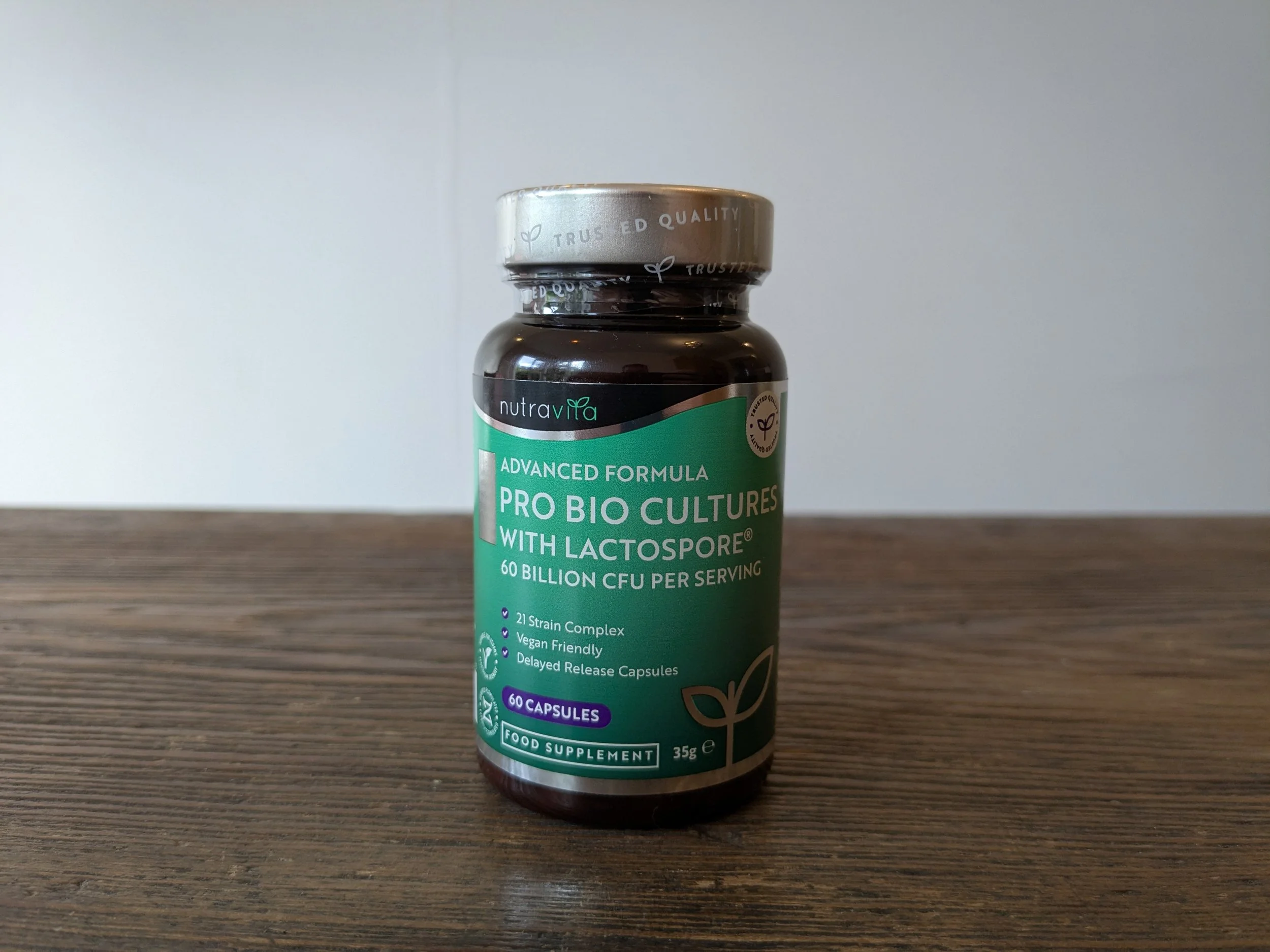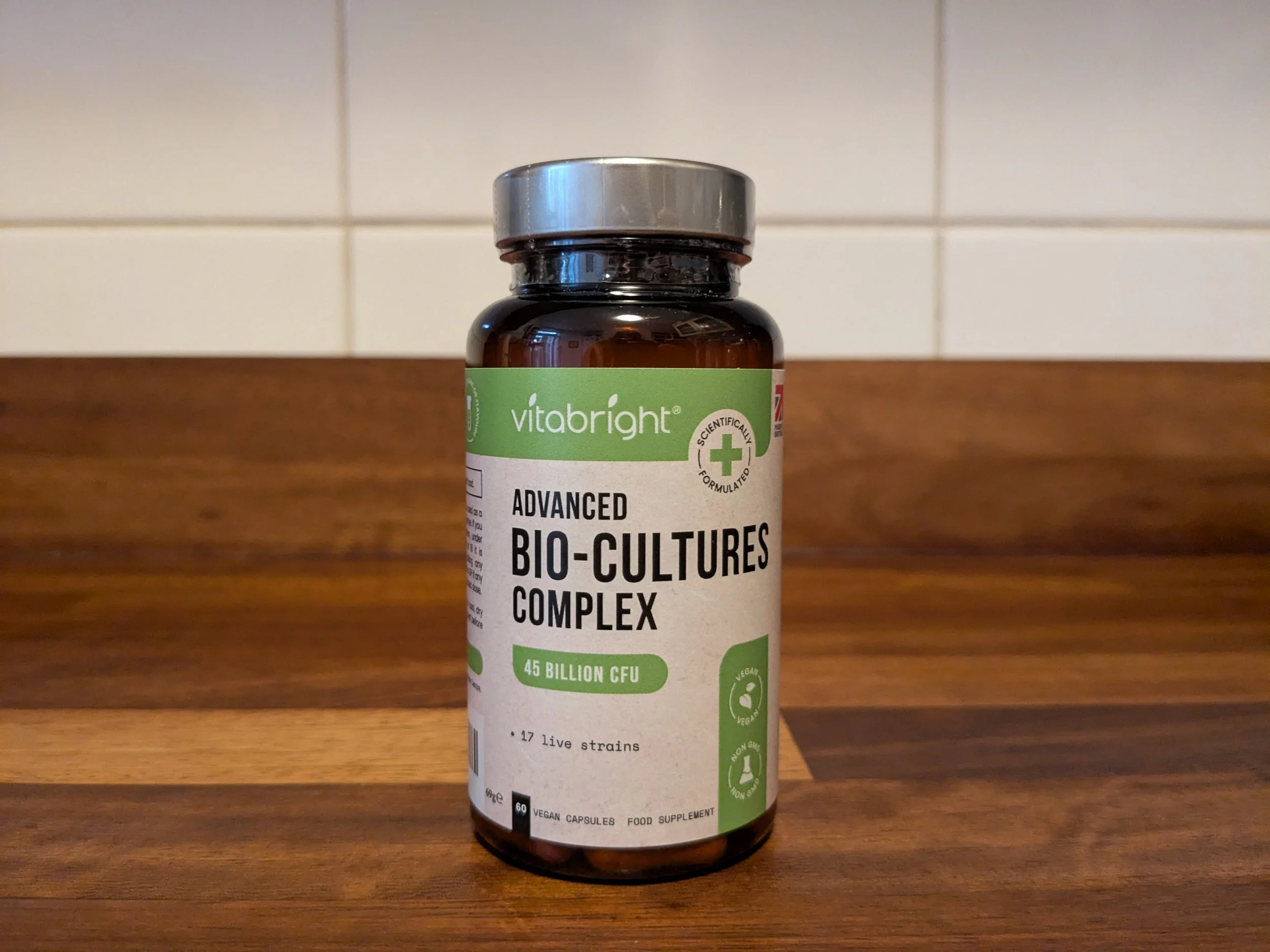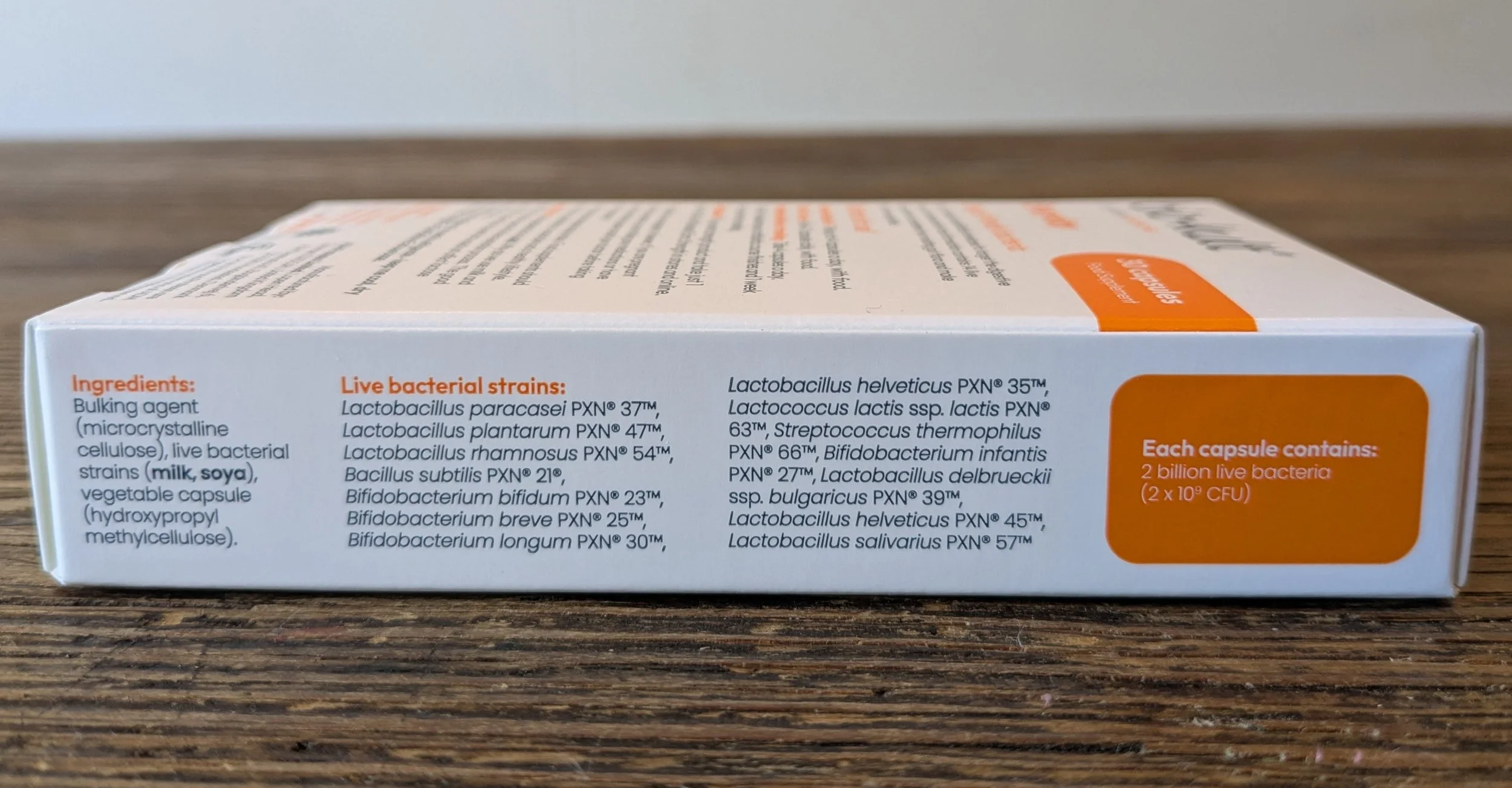Best probiotics in the UK reviewed - tried and tested 2025
Last updated: 22 October 2025 | Please note this article contains affiliate links.
We’ve personally tried and tested some of the best probiotics in the UK, including leading supplements from Symprove, Bio-Kult, Optibac, Nutravita, Vitabright, Now, Microbz and YourBiology.
Each product has been reviewed for its ingredients, bacterial strains, CFU count and value for money, so you can see how they compare and which probiotics stand out for quality and effectiveness.
What are probiotics?
The term ‘probiotic’ is carefully regulated in the UK. According to the International Scientific Association for Probiotics and Prebiotics:
“Probiotics are live microorganisms which, when administered in adequate amounts, confer a health benefit on the host.”
And the NHS takes a very cautious approach by describing them as:
“live bacteria and yeasts promoted as having various health benefits. They’re usually added to yoghurts or taken as food supplements, and are often described as ‘good’ or ‘friendly’ bacteria.”
So websites and manufacturers need to be careful about what health benefit claims they make about probiotic supplements.
The evidence base for some probiotic strains is promising, but results vary between products and individuals.
How to take probiotics
Probiotics are usually taken as capsules, however some brands, like Symprove, are water-based formulas which you take a shot of.
What are colony forming units?
Probiotics are measured in CFU which stands for ‘colony forming units’. This refers to the number of live microorganisms in a product that are capable of multiplying and forming colonies.
In other words, the CFU count shows how many viable bacteria are present in each serving and it’s a way of estimating the amount of live microbes you’re actually consuming.
Limitations of probiotics
It’s important to recognise the limitations of probiotics and not expect them to be a miracle cure on their own.
For the best results, start your probiotic course alongside a balanced, nutrient-rich diet.
This could include:
Eating a wide variety of whole foods such as vegetables, legumes, grains, nuts, seeds and fruits. Focus especially on prebiotic vegetables that feed beneficial gut bacteria such as garlic, onions, asparagus and Jerusalem artichokes.
Drinking plenty of water.
Limiting processed foods.
Reducing caffeine and alcohol intake.
How we test and rate probiotics
We independently review each probiotic using a consistent framework that focuses on transparency, formulation quality and real-world use. Our process looks at both the science and the everyday experience - from strain identification and CFU count to digestibility, taste and ease of use. We also check dietary suitability, labelling accuracy and value for money to make sure the products we recommend are credible, safe and practical to take.
Please note, this section is for transparency and does not replace professional medical advice.
Product formulation and evidence
We start by looking closely at what’s inside the product. That includes the number of species and whether each strain is clearly identified, as only labelled strains can be linked to proper clinical evidence. We look at the CFU count to assess whether the amount is suitable for a quality daily probiotic and note whether the formula includes species which are better regarded as starter cultures for dairy rather than well-evidenced probiotics. We also note any added prebiotics, vitamins or digestive enzymes if they serve a clear functional role within the formula.
Delivery and survival
Probiotics are only useful if they survive long enough to reach your gut. We assess the delivery method, such as capsule or liquid, and how well it protects the bacteria through stomach acid. We also note whether there’s any research or credible testing to support a product’s claimed survivability. We look at digestibility and general tolerance, noting whether users experience bloating or discomfort, and whether the dosage instructions are clear and realistic to follow.
Real-world usability
We factor in how each product feels to take day to day. That covers taste and texture for liquids and ease of taking for capsules. We also look at whether the packaging keeps the bacteria alive without refrigeration.
Suitability and transparency
We check for common dietary needs such as vegan, vegetarian, gluten-free, dairy-free and allergen-free claims. Labelling transparency also matters - full ingredient disclosure, expiry date and any third-party testing are all noted. We consider where the product is made, whether it follows GMP standards and if it meets UK and EU regulatory requirements.
Value and trust
We compare the price to what you actually get. That includes the number of live cultures, quality of strains and overall formulation strength relative to cost. We also take into account the brand’s reputation, user feedback and whether any independent testing confirms the product’s quality.
Author note:
Travis Kelly is the editor of Hello Gut Health and has reviewed more than 150 probiotic and gut-health products. His work focuses on making scientific information about the microbiome clear, accurate and easy to understand.
Best probiotic overall in the UK
YourBiology Gut+ probiotic
YourBiology Gut+ is a premium gut supplement with various ingredients beyond just probiotics to improve gut health and general health. It is aimed at women, however anyone can take it. (If you’d prefer a product aimed at men, Biotics 8 is a very similar product from the same company.)
This supplement contains 10 strains of bacteria to give you a good amount of microbial diversity.
Those strains are:
Lactobacillus acidophilus LA11-ONLLY
Bifidobacterium breve BB8
Lactobacillus plantarum LP-ONLLY
Lactobacillus paracasei LPC28
Lactobacillus fermentum LF33
Saccharomyces boulardii BLD-3
Lactobacillus casei LC18
Bifidobacterium bifidum BB47
Bifidobacterium longum BL88-ONLLY
Lactobacillus rhamnosus LR22
Collectively, these species provide 20 billion colony forming units per three-capsule serving.
This supplement is also suitable for vegans and comes in a delayed-release vegan capsules designed to resist stomach acid before breaking down in the gut.
A broader approach to gut health
As a key point of difference from many other brands, YourBiology Gut+ contains not only probiotics but also prebiotics, digestive enzymes and vitamin D. This means it offers a more holistic approach to gut health than probiotics alone.
Prebiotics are specific types of fibre that feed beneficial bacteria in the gut which help them grow and maintain a healthy balance. This supplement includes two types of prebiotic fibre - inulin and fructooligosaccharides (FOS) - both of which nourish friendly gut microbes.
It also contains three digestive enzymes - lipase, amylase and protease - which help break down fats, carbohydrates and proteins during digestion. These enzymes may aid overall digestive comfort and complement the bacteria in this supplement.
YourBiology Gut+ also provides vitamin D which contributes to the normal function of the immune system. Because immune and gut health are closely connected, maintaining adequate vitamin D levels may indirectly support a healthy gut environment.
Because gut discomfort can have many potential causes, a multi-ingredient approach may be more appealing if you’re looking for all-round digestive support rather than a product that focuses only on probiotics. While not every component will necessarily make a noticeable difference for everyone, this supplement is designed to support several aspects of gut wellbeing in one formula.
Money-back guarantee
Another benefit of YourBiology Gut+ is that they offer a 60-day money-back guarantee if you’re not satisfied.
This kind of full-refund guarantee is not common among probiotics and makes it potentially something worth trying to see if it helps you.
Dosing
The dosing guidelines say to slowly increase the daily intake from 1 to 3 capsules to give your gut time to adjust.
Cost and availability
YourBiology Gut+ is more expensive than many other probiotics because it is a premium and multi-faceted gut health product which also includes prebiotics, digestive enzymes and vitamin D.
Prices vary so it’s best to check their website for current offers. And they also offer a 15% discount on subscriptions.
Summary
Rating: 4.75 stars out of 5.
Verdict: YourBiology Gut+ not only contains 10 strains of live bacteria but also includes two types of prebiotics, three digestive enzymes and vitamin D. It’s designed as a broad, multi-ingredient approach to digestive and immune support which offer more variety than most probiotic-only supplements. However, this more complex formulation comes at a premium price.
Pros
offers a more holistic approach to gut health than most probiotic supplements
10 strains of probiotics - selected for their diversity and potential roles in digestive and general wellbeing
2 types of prebiotics
3 digestive enzymes
20 billion colony forming units of probiotics per serving
delayed-release vegan capsules designed to resist stomach acid before breaking down in the gut
60-day money-back guarantee
Cons
comes as a premium price
Best evidence-backed probiotic
Symprove
Symprove is one of the most researched probiotic supplements available. Independent studies have been conducted at King’s College London and University College London to explore its effects and delivery method.
It’s a water-based probiotic that describes itself as science-led and designed to deliver live bacteria to the gut.
A major feature of Symprove is its formulation. It’s designed to help the bacteria survive stomach acid so more can reach the intestines alive. And the chosen strains have been studied for their ability to tolerate acidic conditions.
Also, the water base may also help protect the cultures during digestion. Symprove claim this liquid formula avoids triggering digestion which could otherwise harm live bacteria.
You can read more about the research done into Symprove in our full review.
Each daily shot provides 10 billion CFU of live bacteria across four strains:
Lacticaseibacillus rhamnosus NCIMB 30174
Enterococcus faecium NCIMB 30176
Lactobacillus acidophilus NCIMB 30175
Lactiplantibacillus plantarum NCIMB 30173
It is gluten-free, dairy-free and suitable for vegans.
Dosing
It is taken as a 70ml shot 10 minutes before breakfast.
Cost and availability
Symprove is available through their website.
On a subscription basis it costs £49.99 per month, or £79.99 as a one-off 4-week purchase.
However, you can get 50% off the first three months using the discount code HELLOGUT50 at symprove.com.
Summary
Rating: 4.75 stars out of 5.
Verdict: Symprove is one of the most evidence-supported probiotics we’ve tested with several independent studies behind it. During my four-month trial I noticed improvements in gut comfort and general wellbeing - although your experience may vary. It’s pricier than some other brands, but the research and water-based formula set it apart.
Pros
four well-researched bacterial strains
10 billion colony forming units per shot
independent studies suggest Symprove’s liquid formula allows more live bacteria to reach the gut compared with certain capsule-based probiotics
well reviewed online with thousands of customer ratings and a high Trustpilot score
in my trial I noticed improvements in overall wellbeing and digestive comfort - though experiences differ from person to person
generous discount code available (below)
Cons
ongoing cost is higher than some other brands
taste of the original flavour is not great initially
having to take 10 minutes before food can sometimes get in the way of routine
some subscription and customer service issues reported on Trustpilot
Discount for you
Use discount code HELLOGUT50 for 50% off the first three months at symprove.com.
Read our full review of Symprove.
Best natural probiotic in the UK
Microbz Revive probiotic
Microbz Revive is a naturally derived probiotic supplement with a broad mix of microbial strains.
Microbz sources its cultures directly from soil rather than engineering them in a lab. As the company explains on its website, this approach aims to “replicate the way nature has supported human health for centuries.”
The formula includes 15 species of live cultures:
Bacillus subtilis
Bifidobacterium bifidum
Bifidobacterium breve
Bifidobacterium infantis (B. longum subsp. infantis)
Bifidobacterium longum
Lactobacillus acidophilus
Lactobacillus casei
Lactobacillus plantarum
Lactobacillus rhamnosus
Saccharomyces boulardii
Lactobacillus fermentum
Saccharomyces cerevisiae
Lactococcus lactis
Streptococcus thermophilus
Lactobacillus bulgaricus (L. delbrueckii subsp. bulgaricus)
However, it’s worth noting that the final four strains are more commonly used as starter cultures for dairy products or as brewer’s or baker’s yeast (ie Saccharomyces cerevisiae) rather than being established probiotics.
Microbz doesn’t list a specific CFU count because each batch is hand-fermented and the number of microbes naturally varies. The brand states that each bottle contains “billions” of live cultures.
The product also includes a range of herbs, minerals and natural ingredients such as agar agar, aloe vera, apple cider vinegar, citrus peel, peppermint oil, slippery elm and turmeric. These are included for their traditional roles in supporting digestion and general wellbeing.
Revive also contains the amino acid L-glutamine which is commonly included in supplements that focus on gut and overall wellbeing.
Microbz supplements are gluten-free, GM-free, wheat-free, dairy-free and sugar-free, and they are vegan and vegetarian approved.
Dosing
You take a 15ml shot or tablespoon before breakfast.
Cost and availability
One bottle for a month’s supply will cost £32.95, or on a subscription basis it will cost £28.
However, you can use discount code hellogut15 for 15% off on the Microbz website.
Summary
4.5 stars out of 5.
Verdict: Microbz Revive is a probiotic supplement which combines a range of naturally sourced live cultures with various botanical ingredients.
Pros
a natural product with live cultures derived from soil
it is a fermented product containing naturally occurring enzymes
contains other natural ingredients used for general wellbeing
15 different species of live cultures…
Cons
…but some species are better regarded as starter cultures or baker/brewer yeast than probiotics
some people may not like the herbaceous taste, at least initially
no information on the actual amount of live cultures (ie colony forming units)
Discount for you
Use discount code hellogut15 for 15% off on the Microbz website.
Best broad spectrum probiotic
Nutravita Pro Bio Cultures probiotic
Nutravita Pro Bio Cultures is an affordable probiotic supplement that provides many species of live cultures and a high total CFU count - however we’ll look into a couple of important caveats below.
This supplement includes 21 strains of live cultures:
Lactobacillus acidophilus LA85
Bifidobacterium bifidum BB32
Lacticaseibacillus paracasei LPC85
Lactobacillus gasseri LG08
Lactiplantibacillus plantarum LP89
Bifidobacterium breve BB70
Bifidobacterium longum BL21
Lacticaseibacillus casei LC89
Limosilactobacillus reuteri LR08
Levilactobacillus brevis LB42
Ligilactobacillus salivarius LS97
Lactobacillus helveticus LH76
Bifidobacterium adolescentis BA28
Bifidobacterium lactis BL86
Bifidobacterium infantis BIF18
Lactobacillus crispatus LC60
Bacillus coagulans (LactoSpore®) MTCC 5856
Limosilactobacillus fermentum LF15
Streptococcus thermophilus ST81
Lactobacillus delbrueckii subsp. bulgaricus LB34
Lactococcus lactis LL66
However, it’s worth stating that the final three strains are more commonly used as starter cultures for yoghurt or cheese rather than being established probiotics.
In terms of the actual amount of bacteria, a two-capsule serving provides 60 billion CFU. However, it’s also worth nothing that Lactobacillus acidophilus makes up over half of this with 32.2 billion CFU.
It also includes a prebiotic fibre in the form of inulin.
It is vegan friendly and doesn’t need to be refrigerated.
Dosing
The dosing guidelines are to take 2 capsules per day with a glass of water.
Cost and availability
Nutravita Pro Bio Cultures probiotic is available online and in some pharmacies.
You can buy a 60-pack from Amazon for £20.
Summary
Rating: 4.5 stars out of 5.
Verdict: Nutravita Pro Bio Cultures probiotic offer many strains of live cultures and a high number of actual bacteria for a decent price.
Pros
reasonably price
contains prebiotic fibre
delayed-release capsule designed to protect the cultures as they pass through stomach acid
high total CFU count, although one strain makes up more than half of it
21 strains of live cultures…
Cons
…but some strains are better regarded as starter cultures than probiotics
no vitamin D or digestive enzymes (which some alternatives offer)
Read our full review of Nutravita Pro Bio Cultures probiotic.
Best value probiotic in the UK
Now Probiotic-10
Now Probiotic-10 is a good value broad spectrum probiotic which also includes a prebiotic.
Now Probiotic-10 includes ten strains of live cultures which are:
Lactobacillus acidophilus (La-14)
Bifidobacterium lactis (Bl-04)
Lactobacillus plantarum (Lp-115)
Lactobacillus casei (Lc-11)
Lactobacillus rhamnosus (Lr-32)
Lactobacillus paracasei (Lpc-37)
Bifidobacterium breve (Bb-03)
Lactobacillus salivarius (Ls-33)
Bifidobacterium longum (Bl-05)
Streptococcus thermophilus (St-21)
Collectively, these strains provide 25 billion colony forming units per capsule.
It also includes a prebiotic fibre in the form of fructooligosaccharides (commonly known as FOS).
It is vegan friendly and doesn’t contain soy or gluten. It also doesn’t need to be refrigerated.
Dosing
The dosing guidelines are to take 1 capsule 1 to 2 times per day between meals or on an empty stomach.
Cost and availability
Now Probiotic-10 is available online through stores like iHerb or Amazon.
Prices vary between vendors and package sizes - however iHerb seems to offer the better value.
You can buy a 50-pack from iHerb for £16 or a 50-pack from Amazon for £26.
Summary
Rating: 4.25 stars out of 5.
Verdict: Now Probiotic-10 offers 10 strains of live cultures and prebiotic fibre for a reasonable price.
Pros
10 strains of live cultures
includes prebiotic fibre
high colony forming unit (CFU) count
the company claims some strains are ‘acid resistant’, although little information is provided to support this
affordable price
Cons
no vitamin D or digestive enzymes (which some alternatives offer)
Another good value probiotic
Optibac Every Day probiotic
Optibac Every Day probiotic is a good value option if you are looking for well researched probiotics.
These probiotic strains are:
Lactobacillus rhamnosus Rosell-11
Lactobacillus acidophilus/helveticus Rosell-52
Bifidobacterium longum Rosell-175
Bifidobacterium breve Rosell-70
Bifidobacterium bifidum Rosell-71
Lactococcus lactis Rosell-1058
Six strains is on the lower side for a supplement, but Optibac states that these strains are well-researched and have been studied for their ability to tolerate stomach acid which may help more live bacteria reach the gut.
In terms of the actual amount of bacteria, these strains collectively provide 5 billion colony forming units per capsule.
This supplement does not need to be refrigerated and it is vegan friendly as well as gluten free.
Dosing
The dosing guidelines are to take 1 capsule per day, ideally with breakfast.
Cost and availability
Optibac Every Day is widely available in the UK and online.
The recommended retail price for a 30-pack is £14.
Summary
Rating: 4.25 stars out of 5.
Verdict: Optibac Every Day is an affordable probiotic supplement that includes well-researched strains and added prebiotic fibre.
Pros
affordable
contains prebiotic fibre
strains have been studied for their ability to survive stomach acidity
Cons
six strains of live cultures is fewer than in some other brands
no vitamin D or digestive enzymes (which some alternatives offer)
Another good broad spectrum probiotic
Vitabright Bio Cultures probiotic
Vitabright Bio Cultures probiotic is a decent value option - however it has similar downsides to Nutravita.
Vitabright Bio Cultures includes 17 strains of live cultures:
Lactobacillus acidophilus
Lactobacillus rhamnosus
Lactobacillus plantarum
Lactobacillus casei
Lactobacillus reuteri
Lactobacillus gasseri
Bifidobacterium longum
Bifidobacterium breve
Bifidobacterium bifidum
Bifidobacterium animalis subsp. lactis (labelled Bifidobacterium lactis)
Bacillus coagulans
Lactobacillus helveticus
Lactobacillus salivarius
Lactobacillus brevis
Lactobacillus delbrueckii subsp. bulgaricus (labelled Lactobacillus bulgaricus)
Streptococcus thermophilus
Lactococcus lactis (labelled Lactobacillus lactis)
Similar to Nutravita, the final three species are more commonly used as starter cultures for yoghurt or cheese rather than being established probiotics.
In terms of this actual amount of live cultures, two capsules provide 45 billion CFU. Also similar to Nutravita, over two-thirds of the CFU count are of just one species. Lactobacillus acidophilus makes up 32 billion of 45 billion.
It also includes a prebiotic fibre in the form of inulin.
It is vegan friendly and doesn’t need to be refrigerated.
Dosing
The dosing guidelines are to take 2 capsules per day preferably with food.
Cost and availability
Vitabright Bio Cultures probiotic is available online and in some pharmacies.
The recommended retail price for 60 capsules is £19.
Summary
Rating: 4.25 stars out of 5.
Verdict: Vitabright Bio Cultures probiotic includes many strains of live cultures and a high CFU count.
Pros
affordable
contains prebiotic fibre
high CFU count, but just one species comprises more than two-thirds of the total number
17 strains of live cultures…
Cons
…but some strains are better regarded as starter cultures than probiotics
no vitamin D or digestive enzymes (which some alternatives offer)
Read our full review of Vitabright Bio Cultures probiotic.
Other probiotics available in the UK
Bio-Kult Everyday probiotic
Bio-Kult Everyday probiotic is one to consider if you want to save money on a supplement which just contains probiotics.
It includes 14 strains of live cultures:
Lactobacillus paracasei PXN® 37
Lactobacillus plantarum PXN® 47
Lactobacillus rhamnosus PXN® 54
Bacillus subtilis PXN® 21
Bifidobacterium bifidum PXN® 23
Bifidobacterium breve PXN® 25
Bifidobacterium longum PXN® 30
Bifidobacterium infantis PXN® 27
Lactobacillus salivarius PXN® 57
Lactobacillus helveticus PXN® 35
Lactococcus lactis ssp. lactis PXN® 63
Lactobacillus helveticus PXN® 45
Streptococcus thermophilus PXN® 66
Lactobacillus delbrueckii ssp. bulgaricus PXN® 39
As with some other brands, the final two strains are more commonly used as starter cultures for yoghurt rather than being established probiotics.
In terms of the actual amount of bacteria, these strains collectively provide 2 billion colony forming units per capsule - which is quite low compared to other brands.
This supplement does not need to be refrigerated and it is suitable for vegetarians and is gluten free. It does contain milk and soya allergens though.
Dosing
The dosing guidelines are to take up to 4 capsules per day with food.
Cost and availability
Bio-Kult Everyday probiotic is widely available in the UK and online.
The regular retail price for a 30-pack is £10.50.
Summary
Rating: 4 stars out of 5.
Verdict: Bio-Kult Everyday is a simple probiotic supplement at an affordable price. It contains a good variety of bacterial strains but has a relatively low CFU count.
Pros
affordable
14 strains of live cultures…
Cons
…but some strains are better regarded as starter cultures than probiotics
low actual number of bacteria with 2 billion colony forming units per capsule
no prebiotics, vitamin D or digestive enzymes (which some alternatives offer)
Your reviewer
This review was written by Travis, founder of Hello Gut Health.
A long-time gut health writer and advocate with over ten years of experience exploring the science of the microbiome and fermentation.
He combines careful research with practical testing to help readers make informed, trustworthy choices.
He has reviewed over 150 gut health products.
References
National Health Service / NHS - https://www.nhs.uk/tests-and-treatments/probiotics/
International Scientific Association for Probiotics and Prebiotics - https://isappscience.org/topic/probiotics/




















